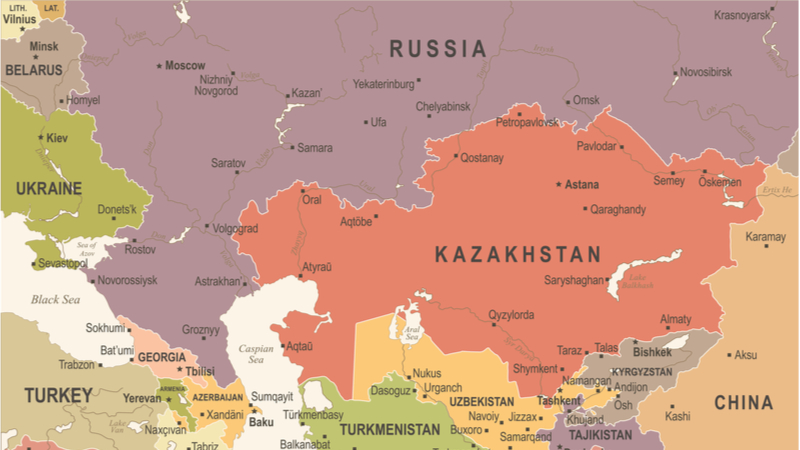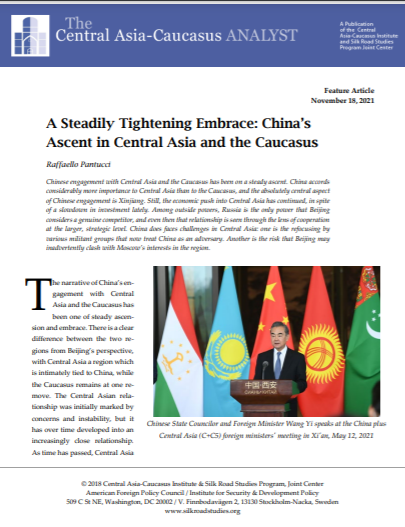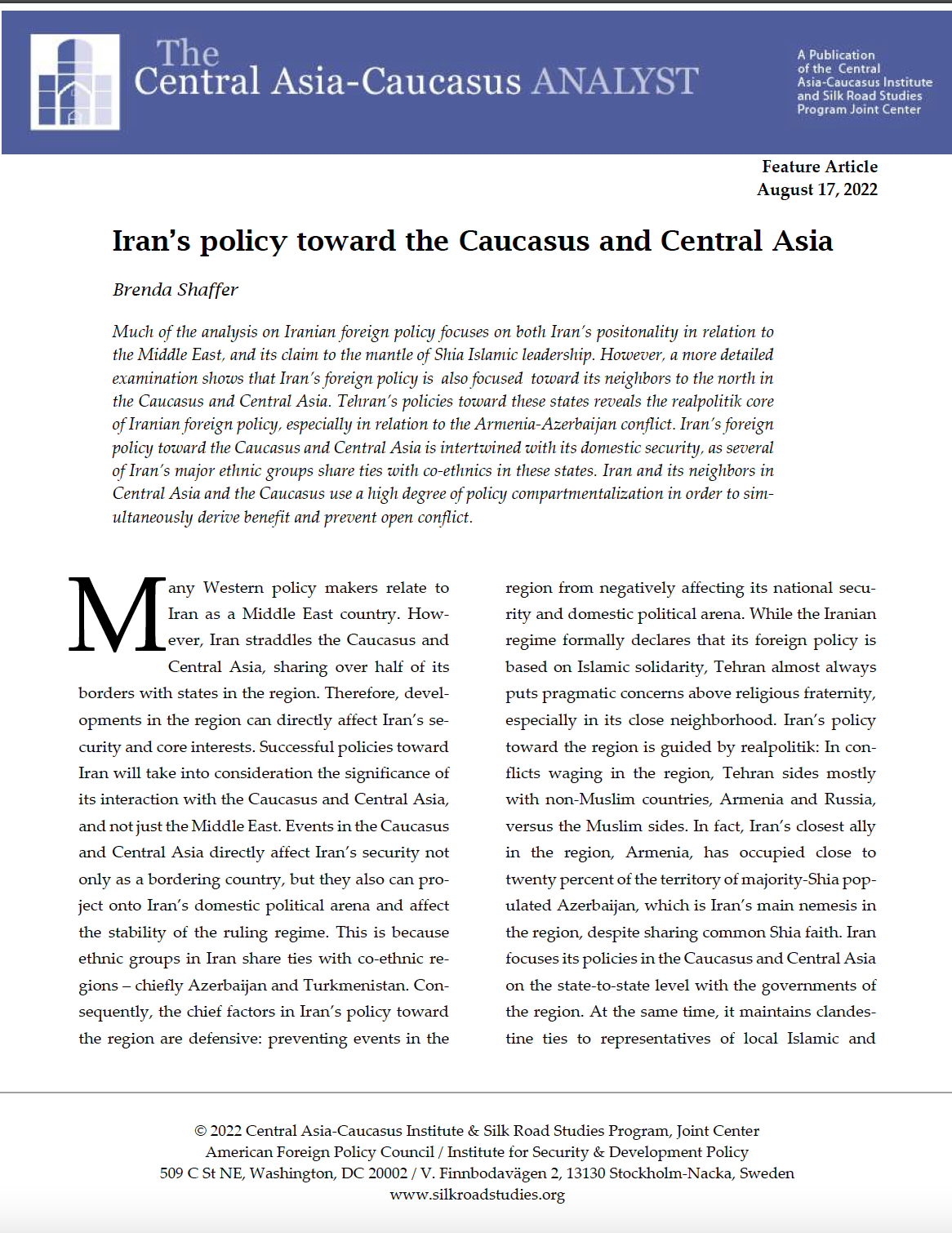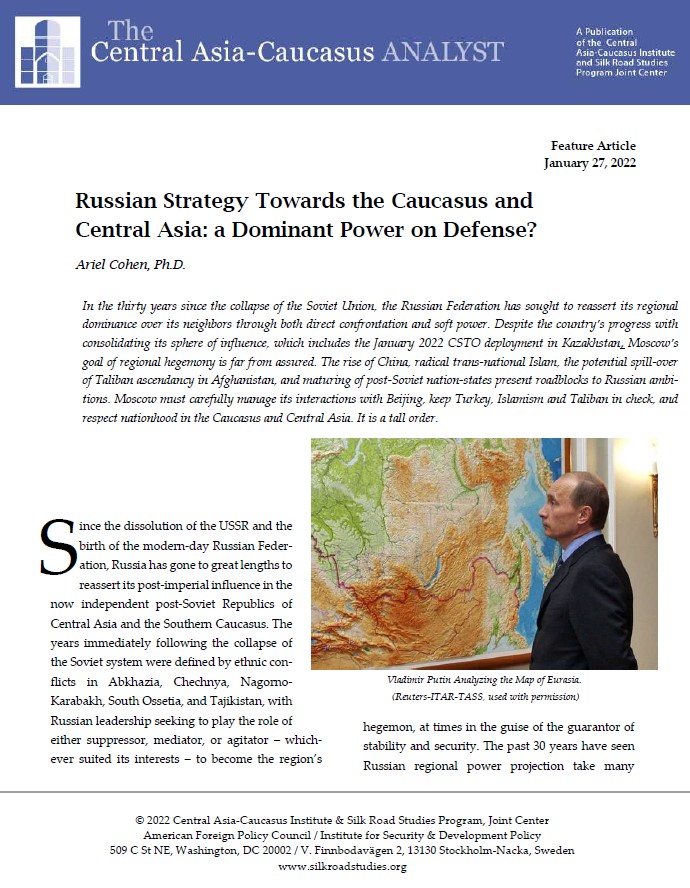Iran’s policy toward the Caucasus and Central Asia
By Brenda Shaffer
August 17, 2022
Much of the analysis on Iranian foreign policy focuses on both Iran’s positonality in relation to the Middle East, and its claim to the mantle of Shia Islamic leadership. However, a more detailed examination shows that Iran’s foreign policy is also focused toward its neighbors to the north in the Caucasus and Central Asia. Tehran’s policies toward these states reveals the realpolitik core of Iranian foreign policy, especially in relation to the Armenia-Azerbaijan conflict. Iran’s foreign policy toward the Caucasus and Central Asia is intertwined with its domestic security, as several of Iran’s major ethnic groups share ties with co-ethnics in these states. Iran and its neighbors in Central Asia and the Caucasus use a high degree of policy compartmentalization in order to simultaneously derive benefit and prevent open conflict.
Russia's War in Ukraine: Implications for Central Asia
By Johan Engvall
March 14, 2022
Russia’s invasion of Ukraine and the West’s economic response to it has put Central Asia in a precarious position. As part of what Moscow perceives as its sphere of interest, the repercussions of Putin’s war are bound to affect the Central Asian countries particularly hard. While anything but static, the nature of the Russia-Central Asia relationship still enables Moscow to retain a strong influence in the region. Russia remains the dominant security actor in Central Asia, even more so following the U.S. withdrawal from Afghanistan. Their economies remain closely interlinked with Russia, and at the political level, a distinct type of post-Soviet authoritarian leadership model with roots in the Soviet system facilitates political dialogue. Western disengagement from the region has left them more vulnerable, but the unpredictable consequences of Russia’s military adventurism might force them to realign their external relations.

U.S.-Russian Cold War - At Central Asia's expense?
By Farkhod Tolipov
February 10, 2022, the CACI Analyst
Two events in December 2021 signified the growing cleavage between the U.S. and Russia: U.S. President Biden initiated the Summit for Democracy while the Kremlin proposed a treaty between the Russian Federation and the U.S. on security guarantees, purportedly to ensure the security of the Russian Federation and NATO member states. Both initiatives pose challenges to the former Soviet republics of Central Asia in terms of their independence as well as their long-term perspective of political development. These events test Central Asian countries’ ability to withstand neo-imperial pressure, as well as their stated commitment to democratic choice.

Russian Strategy Towards the Caucasus and Central Asia: a Dominant Power on Defense?
Russian Strategy towards the Caucasus and Central Asia: A Dominant Power on Defense?
By: Ariel Cohen, Ph.D.
In the thirty years since the collapse of the Soviet Union, the Russian Federation has sought to reassert its regional dominance over its neighbors through both direct confrontation and soft power. Despite the country’s progress with consolidating its sphere of influence, which includes the January 2022 CSTO deployment in Kazakhstan, Moscow’s goal of regional hegemony is far from assured. The rise of China, radical trans-national Islam, the potential spill-over of Taliban ascendancy in Afghanistan, and maturing of post-Soviet nation-states present roadblocks to Russian ambitions. Moscow must carefully manage its interactions with Beijing, keep Turkey, Islamism and Taliban in check, and respect nationhood in the Caucasus and Central Asia. It is a tall order.
Since the dissolution of the USSR and the birth of the modern-day Russian Federation, Russia has gone to great lengths to reassert its post-imperial influence in the now independent post-Soviet Republics of Central Asia and the Southern Caucasus. The years immediately following the collapse of the Soviet system were defined by ethnic conflicts in Abkhazia, Chechnya, Nagorno-Karabakh, South Ossetia, and Tajikistan, with Russian leadership seeking to play the role of either suppressor, mediator, or agitator – whichever suited its interests – to become the region’s hegemon, at times in the guise of the guarantor of stability and security.
A Steadily Tightening Embrace: China’s Ascent in Central Asia and the Caucasus
A Steadily Tightening Embrace: China’s Ascent in Central Asia and the Caucasus
By: Raffaello Pantucci
 Chinese engagement with Central Asia and the Caucasus has been on a steady ascent.China accords considerably more importance to Central Asia than to the Caucasus, and theabsolutely central aspect of Chinese engagement is Xinjiang. Still, the economic push intoCentral Asia has continued, in spite of a slowdown in investment lately. Among outsidepowers, Russia is the only power that Beijing considers a genuine competitor, and even then that relationship is seen through the lens of cooperation at the larger, strategic level. China does faces challenges in Central Asia: one is the refocusing by various militant groups that now treat China as an adversary. Another is the risk that Beijing may inadvertently clash with Moscow’s interests in the region.
Chinese engagement with Central Asia and the Caucasus has been on a steady ascent.China accords considerably more importance to Central Asia than to the Caucasus, and theabsolutely central aspect of Chinese engagement is Xinjiang. Still, the economic push intoCentral Asia has continued, in spite of a slowdown in investment lately. Among outsidepowers, Russia is the only power that Beijing considers a genuine competitor, and even then that relationship is seen through the lens of cooperation at the larger, strategic level. China does faces challenges in Central Asia: one is the refocusing by various militant groups that now treat China as an adversary. Another is the risk that Beijing may inadvertently clash with Moscow’s interests in the region.











 Book S. Frederick Starr and Svante E. Cornell,
Book S. Frederick Starr and Svante E. Cornell,